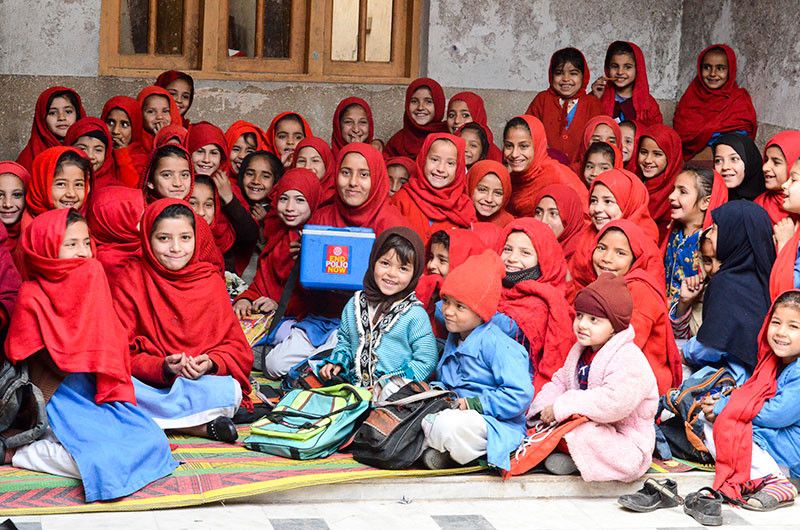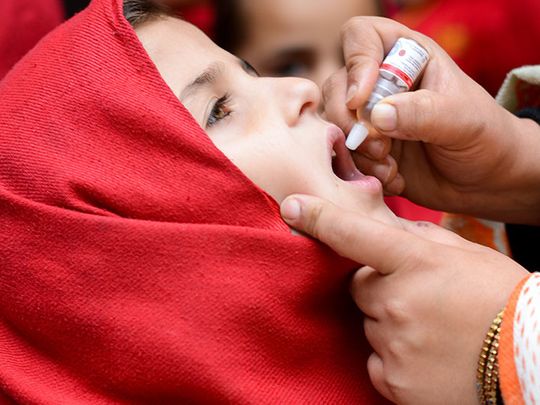
Islamabad: The year 2019 was catastrophic for Pakistan’s polio campaign as 144 cases were reported from across the country — a dramatic increase since 2015.
Despite inching closer to the polio-free goal in 2017 and 8 recorded cases, the country is beset with a myriad of challenges leading to persistently missed children during the immunisation campaigns. One of the key issues, according to experts, is poor data management. During the anti-polio campaigns, health workers go door-to-door for coverage and mark walls of the houses manually, do finger markings and take notes to keep track of the vaccination status. This can be an arduous task in a megacity like Karachi estimated to have a population of 20 million.
HOW CAN TECHNOLOGY AND DATA HELP?
Interestingly, a small district of Vehari in southern Punjab has come up with a smart solution. “The solution is simple, cheap and digital. All we need is smartphones and an app to keep track of the reliable information,” says Waqas Rashid, deputy commissioner (DC) of Vehari, a district with 3 million residents.
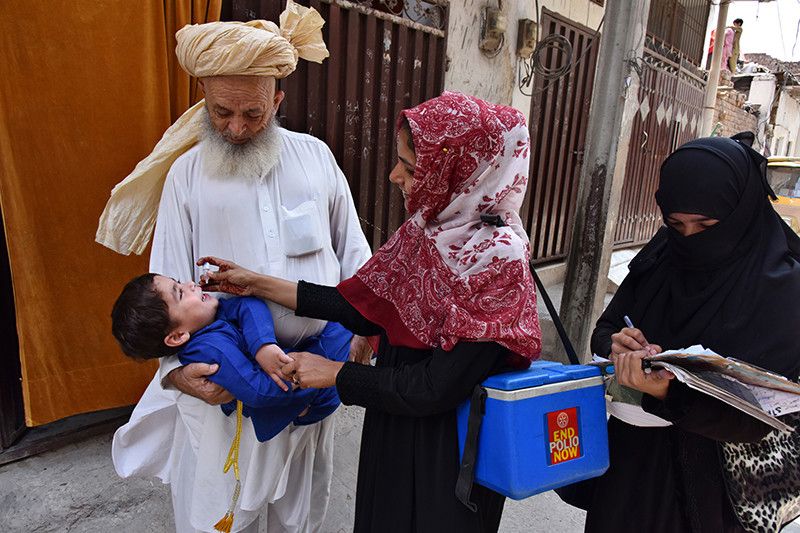
The Vehari DC office has already developed and tested an e-polio smartphone application to digitally monitor the vaccination drive and record data of the households, and children vaccinated. “We have launched the e-polio pilot project in Danewal, one urban union council (UC) of Vehari district to ensure accurate implementation during the first polio campaign of 2020,” DC Waqas Rashid told Gulf News. A total of 60 polio workers, involved in the pilot project, recorded names of all family members, ages of the children, home addresses and contacts. “The database would help the polio workers and health ministry to accurately record and administer immunisation campaigns, making it easy to follow up on the missed children.”
HOW DOES THE E-POLIO APP WORK?
“The smartphone app using GIS mapping technology makes it convenient to register and identify households. The technological surveillance approach allows quick, accurate, and up-to-date data monitoring to ensure 100 per cent coverage,” Rashid said.
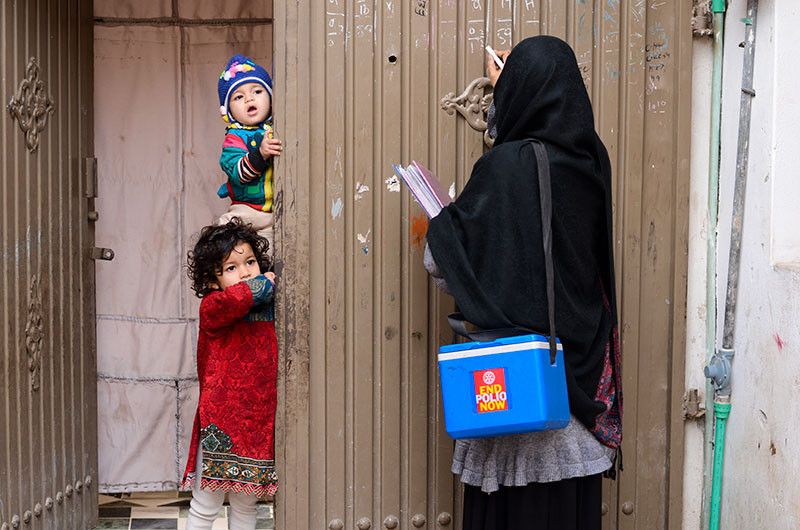
The data of 3,811 households and 6,214 children under the age of five have been recorded in the android app so far, DC Vehari shared with Gulf News. Nearly 5,610 children received polio vaccine during the current campaign in the union council. The e-polio team has also joined forces with schools to ensure no child is missed. “Previously, the children at school or those travelling would usually miss the vaccine. And that one missed child puts the whole community at risk. This is why we are involving schools to ensure no child is left behind.”
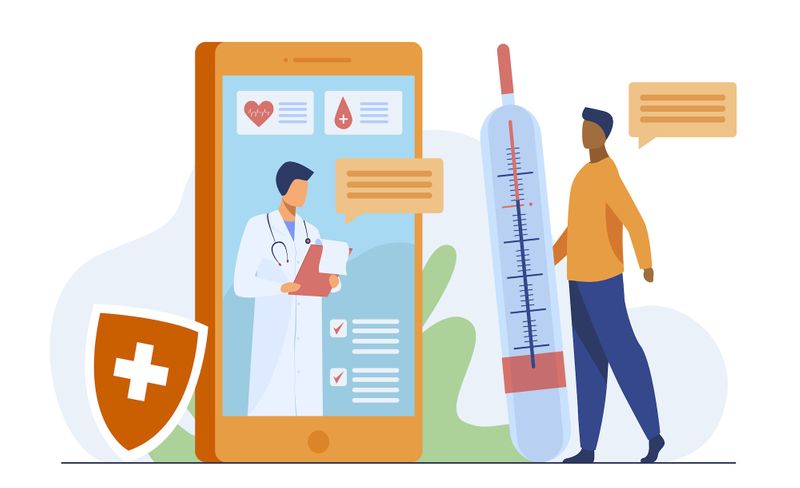
The e-polio app is the initiative of the Vehari administration, developed by Tauqeer Ikram with the help of experts in the field of technology, health and education. It took the team less than 2 weeks and minimum cost to research and implement the project.
After the outcome of the project is shared with the national polio centre, Rashid hopes that the system developed in the lesser-known district of Vehari would be implemented at the national level and eventually help defeat polio from Pakistan.
PAKISTAN’S 2020 ANTI-POLIO CAMPAIGN AND ROLE OF GLOBAL PARTNERS
To push the virus back, Pakistan launched this year’s first nationwide polio vaccination on February 17 to vaccinate 39.6 million children under the age of five with the help of more than 265,000 polio workers. “We are committed to reach every last child with the essential polio vaccine” says Dr Zafar Mirza, the health minister. This time, the health department has extensively involved provincial and district teams for better preparedness.
The role of international partners such as WHO, Unicef and particularly the United Arab Emirates (UAE) has been critical to finance and support the vaccination campaign. The UAE is a key partner in the new anti-polio campaign launched by Prime Minister Imran Khan and is determined to help Pakistan eradicate polio by 2022 under the UAE-Pakistan Assistance Program (UAEPAP).
DIGITAL INTERVENTION CRITICAL TO IMPROVING HEALTHCARE
Pakistan, along with Afghanistan, is one of the two remaining countries in the world with ongoing wild poliovirus transmission. “The current geographical spread and the intensity of the virus transmission poses a real risk to our children” says Dr Rana Muhammad Safdar, coordinator for the National Emergency Operations Centre. This threat makes it all the more important to implement a digital health intervention, says DC Vehari Rashid. “We are living in a digital world. Why should we not embrace technology to improve health care? I believe it’s time to adopt a digital approach to protect our children from the crippling virus and offer them a better life.”
Key Facts
Data of 3,811 households and 6214 children under the age of five recorded.
Around 5,610 children received the polio drops in union council 2 Danewal of Vehari.
A total of polio 144 cases reported from across Pakistan in 2019.
Features of e-polio app
1. Registration of all households and children.
2. Geo-tagging and locations of all households.
3. Monitor data during polio campaigns using the app to keep track of vaccination status.
4. To visualise and map the status of children both vaccinated and missed.
5. To integrate data with the web application for visualisation and analysis.
6. Integrate data of students in schools to ensure no child is missed.
7. Create awareness among the masses.


